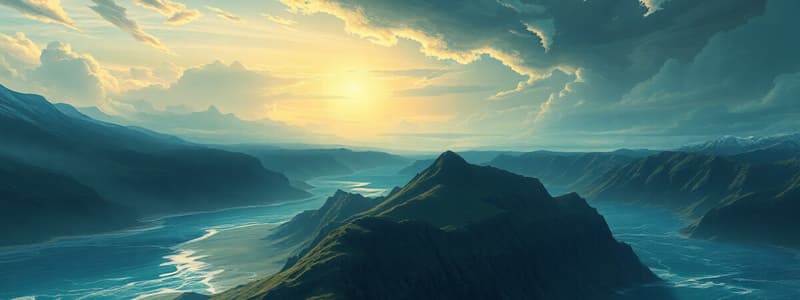Podcast
Questions and Answers
If a scientist is studying the patterns of ocean currents, the impact of climate change on marine ecosystems, and the potential of tidal energy, which branch of Earth science are they primarily working in?
If a scientist is studying the patterns of ocean currents, the impact of climate change on marine ecosystems, and the potential of tidal energy, which branch of Earth science are they primarily working in?
- Meteorology
- Geology
- Astronomy
- Oceanography (correct)
The study of earthquakes and seismic waves falls under which specialized area of geology?
The study of earthquakes and seismic waves falls under which specialized area of geology?
- Historical Geology
- Seismology (correct)
- Physical Geology
- Volcanology
Differentiating between Physical and Historical Geology, which of the following questions is primarily addressed by Historical Geology?
Differentiating between Physical and Historical Geology, which of the following questions is primarily addressed by Historical Geology?
- What are the physical properties of different types of rocks and minerals?
- What are the different layers of the Earth's interior and their composition?
- How do tectonic plates move and interact to create mountains and valleys?
- In what sequence did major geological events occur to shape the Earth as we know it today? (correct)
A meteorologist is analyzing atmospheric pressure, temperature changes, and humidity levels to predict an upcoming storm. This work primarily exemplifies the role of meteorology in:
A meteorologist is analyzing atmospheric pressure, temperature changes, and humidity levels to predict an upcoming storm. This work primarily exemplifies the role of meteorology in:
Flashcards
Earth Science
Earth Science
The study of Earth and its neighboring planets, including their formation and historical events.
Physical Geology
Physical Geology
The branch of Earth Science that focuses on the structure, form, and components of the Earth.
Historical Geology
Historical Geology
The branch of Earth Science that studies the historical processes and events that led to the formation of Earth and life.
Seismology
Seismology
Signup and view all the flashcards
Volcanology
Volcanology
Signup and view all the flashcards
Study Notes
- Earth science encompasses the study of Earth and its neighboring planets.
- It explores historical events and processes related to Earth's formation.
- The four main branches of Earth science are geology, meteorology, astronomy, and oceanography.
Geology
- Geology is derived from Greek and Latin roots, with "geo" meaning earth and "-ology" meaning the study of.
- Geology is divided into physical and historical geology.
- Physical geology focuses on Earth's structure, form, and components.
- Historical geology studies past events and processes that shaped Earth and life.
- Seismology and volcanology are key specialties within geology, focusing on earthquakes and volcanoes, respectively.
Meteorology
- Meteorology involves the analysis, prediction, and forecasting of weather.
- Meteorologists provide information on weather changes, rain chances, and storms.
Oceanography
- Oceanography studies tides, waves, ocean processes, and changes.
- Oceanographers offer important data on climate change's impact on oceans.
- They help find solutions for using tides and waves as renewable energy sources.
Studying That Suits You
Use AI to generate personalized quizzes and flashcards to suit your learning preferences.



